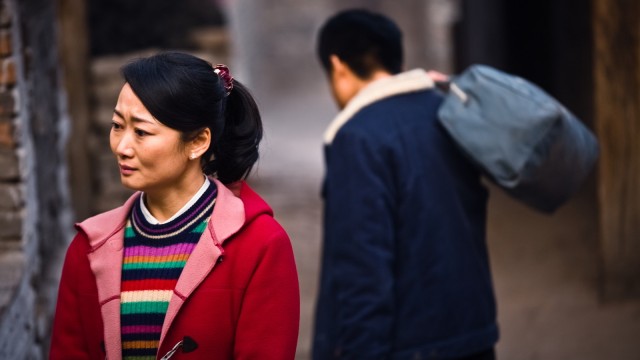
Zhang Jinsheng (Zhang Yi) shows his love for Shen Tao (Zhao Tao) in materialistic ways in Jia Zhangke’s MOUNTAINS MAY DEPART
MOUNTAINS MAY DEPART (SHAN HE GU REN) (Jia Zhangke, 2015)
MoMA Film, Museum of Modern Art
11 West 53rd St. between Fifth & Sixth Aves.
Friday, January 1, 7:30
Series runs through January 15
Tickets: $12; may be applied to museum admission within thirty days, same-day screenings free with museum admission, available at Film and Media Desk beginning at 9:30 am
212-708-9400
www.moma.org
 Master Chinese writer-director Jia Zhangke returned to the New York Film Festival this year with Mountains May Depart, a melancholic look at love and relationships in which one decision can change the rest of your life, as well as an allegory about China itself and its path in the world. Jia’s wife and muse, Zhao Tao, stars as Shen Tao, a flighty, flakey young woman flirting with coal miner Liangzi (Liang Jin Dong) and burgeoning capitalist Zhang Jinsheng (Zhang Yi) in 1999 China, the country on the cusp of an economic crisis. It’s easy to see the young woman’s romantic decision as a microcosm of China’s economic decisions, as the working class battles the wealthy elite, and the effects of both are profound. The setup is reminiscent of the love triangle at the center of François Truffaut’s Jules et Jim, but Jia takes it much further, continuing the story in 2014, and then into 2025, a bleak future where individual happiness is painfully elusive. Jia (Still Life, The World, 24 City) and his longtime cinematographer, Yu Lik-wai, shoot the three time periods in different screen ratios, exemplifying how much things evolve as Chinese capitalism and globalism take over, affecting — and disaffecting — the next generation. But the past is always snapping at the characters’ heels; much of the film takes place in the Yellow River basin, where ancient structures recall China’s history, and in Jia’s vision of the future, vinyl LPs are back in fashion (although handheld devices are much cooler). Music plays a key role in the film, primarily Sally Yeh’s Cantonese song “Take Care” and the Pet Shop Boys’ cover of the Village People’s “Go West,” the latter a title that gets to the heart of the film.
Master Chinese writer-director Jia Zhangke returned to the New York Film Festival this year with Mountains May Depart, a melancholic look at love and relationships in which one decision can change the rest of your life, as well as an allegory about China itself and its path in the world. Jia’s wife and muse, Zhao Tao, stars as Shen Tao, a flighty, flakey young woman flirting with coal miner Liangzi (Liang Jin Dong) and burgeoning capitalist Zhang Jinsheng (Zhang Yi) in 1999 China, the country on the cusp of an economic crisis. It’s easy to see the young woman’s romantic decision as a microcosm of China’s economic decisions, as the working class battles the wealthy elite, and the effects of both are profound. The setup is reminiscent of the love triangle at the center of François Truffaut’s Jules et Jim, but Jia takes it much further, continuing the story in 2014, and then into 2025, a bleak future where individual happiness is painfully elusive. Jia (Still Life, The World, 24 City) and his longtime cinematographer, Yu Lik-wai, shoot the three time periods in different screen ratios, exemplifying how much things evolve as Chinese capitalism and globalism take over, affecting — and disaffecting — the next generation. But the past is always snapping at the characters’ heels; much of the film takes place in the Yellow River basin, where ancient structures recall China’s history, and in Jia’s vision of the future, vinyl LPs are back in fashion (although handheld devices are much cooler). Music plays a key role in the film, primarily Sally Yeh’s Cantonese song “Take Care” and the Pet Shop Boys’ cover of the Village People’s “Go West,” the latter a title that gets to the heart of the film.
Zhao is marvelous as the bittersweet Shen, from singing at the colorful Fenyang Spring Festival Gala as the new millennium approaches to trying to restore her relationship with her son (Dong Zijian), who her husband insisted be named Dollar. Her eyes are filled with emotion as she proceeds on a course that was never what she dreamed. In the third section, Sylvia Chang shines as Mia, a sensitive, divorced teacher from Hong Kong who grows close to Dollar in a future world in which English has eclipsed Chinese, so fathers and sons literally do not speak the same language. Navigating the four physical sufferings of Buddhist thought — birth, old age, sickness, and death, Jia avoids showing many key moments in the lives of the characters, often leaving it up to the audience to uncover what has happened over the years and decades, which has a certain grace, although the ambiguous ending is more than a bit frustrating, even if it makes sense as a parable for China as a whole. But it’s all encapsulated in the briefest of kisses in a helicopter that will both brighten and break your heart. And keep an eye out for the guy with the Guangdong Broadsword. Mountains May Depart is screening January 1 at 7:30 in MoMA’s annual series “The Contenders,” which consists of films the institution believes will stand the test of time; the festival continues through January 15 with such other 2015 works as George Miller’s Max Mad: Fury Road, David Robert Mitchell’s It Follows, Michael Moore’s Where to Invade Next, and John Crowley’s Brooklyn.
